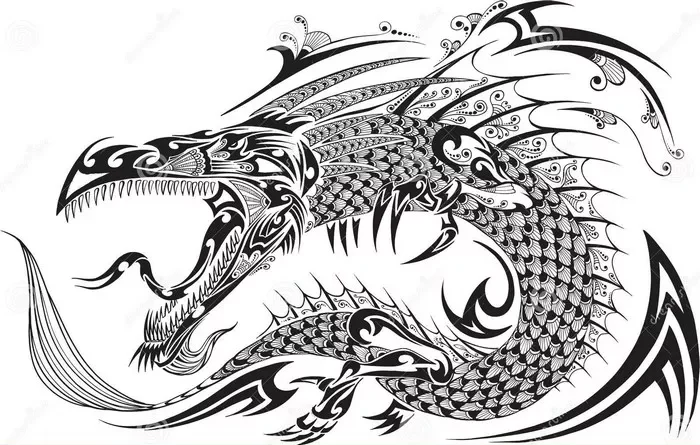Tattoos have been an integral part of human culture for centuries, serving as symbols of identity, status, and personal expression. Among the myriad of tattoo designs, dragon tattoos stand out as powerful and enigmatic symbols, deeply rooted in the cultural and historical narratives of East Asia. However, a common question that often arises is whether a dragon tattoo is Chinese or Japanese in origin. To unravel this question, we must delve into the rich tapestry of Chinese and Japanese cultures, exploring the origins, symbolism, and cultural significance of the dragon tattoo in each tradition.
The Mythical Dragon: A Symbol of Power and Majesty
In both Chinese and Japanese cultures, the dragon holds a revered place as a symbol of power, strength, and good fortune. However, the portrayal and interpretation of the dragon vary significantly between the two traditions.
The Chinese Dragon: Imperial Symbol and Cosmic Guardian
In Chinese mythology, the dragon is a divine creature associated with the heavens, water, and the essence of life itself. Unlike the fire-breathing dragons of Western folklore, Chinese dragons are depicted as benevolent beings capable of bringing rain and prosperity to the land. With a sinuous body adorned with scales, claws, and antler-like horns, the Chinese dragon symbolizes the Emperor’s divine right to rule and serves as a guardian of the celestial realms.
The image of the Chinese dragon is deeply ingrained in Chinese culture, with its origins dating back thousands of years to the ancient dynasties of China. From the majestic dragon dances of the Lunar New Year to the intricate carvings adorning imperial palaces, the dragon is omnipresent in Chinese art, literature, and folklore.
The Japanese Dragon: Guardian of the Earth and Sea
In Japanese mythology, the dragon, known as “ryū” or “tatsu,” occupies a similarly revered position, albeit with distinct characteristics and symbolism. Unlike its Chinese counterpart, the Japanese dragon is often depicted with three claws instead of five and is associated with water rather than the heavens.
In Japanese folklore, dragons are often portrayed as serpentine creatures capable of both great benevolence and ferocious wrath. They are believed to reside in bodies of water such as lakes, rivers, and oceans, where they serve as guardians of the natural world. Legends abound of heroic warriors and noble samurai encountering dragons on their quests, with the creatures bestowing blessings or imparting wisdom to those deemed worthy.
The Art of Tattooing: A Cultural Bridge
Tattooing has a long and storied history in both China and Japan, with each culture developing its unique artistic styles and techniques. In ancient China, tattoos were often associated with criminality or as marks of societal status, while in Japan, tattoos held spiritual and ceremonial significance, particularly among the indigenous Ainu people.
However, it was during the Edo period (1603-1868) in Japan that tattooing flourished as an art form, with intricate designs covering the bodies of samurai warriors and commoners alike. These tattoos, known as “irezumi,” often depicted mythological creatures such as dragons, along with motifs from nature, folklore, and literature.
In China, tattooing has experienced a resurgence in recent decades, fueled by a growing interest in traditional culture and artistic expression. Modern Chinese tattoo artists draw inspiration from the rich tapestry of Chinese mythology and symbolism, including the iconic image of the dragon.
The Dragon Tattoo: A Fusion of Cultures
In contemporary tattoo culture, dragon tattoos have transcended their cultural origins to become a global phenomenon, admired for their aesthetic beauty and symbolic depth. Whether inked in the traditional Japanese style of irezumi or the vibrant hues of Chinese ink wash painting, dragon tattoos continue to captivate enthusiasts around the world.
For many individuals, the decision to get a dragon tattoo is deeply personal, reflecting their connection to East Asian culture, their admiration for the symbolism of the dragon, or simply their appreciation for the artistry of tattooing. Regardless of cultural background, the dragon tattoo serves as a potent symbol of strength, resilience, and transformation.
Conclusion
In conclusion, the question of whether a dragon tattoo is Chinese or Japanese is ultimately a reflection of the interconnectedness of human cultures and the fluidity of artistic expression. While the dragon holds distinct meanings and symbolism in Chinese and Japanese traditions, its allure transcends cultural boundaries, resonating with people of diverse backgrounds and beliefs.
Whether you choose to adorn your body with a Chinese-style dragon tattoo to evoke the majesty of imperial dynasties or opt for a Japanese-inspired design to honor the mythical creatures of samurai lore, the dragon tattoo remains a timeless symbol of power, wisdom, and spiritual enlightenment.
In the tapestry of human history, the dragon soars as a symbol of our shared aspirations and collective imagination, reminding us of the boundless possibilities that await those who dare to dream. So, the next time you gaze upon a dragon tattoo, remember that its origins may lie in the distant shores of China or Japan, but its meaning is universal: a testament to the enduring power of human creativity and the indomitable spirit of the dragon.

